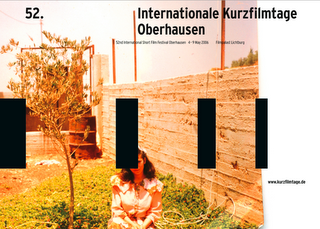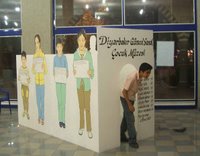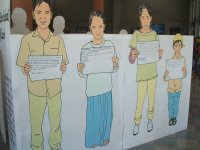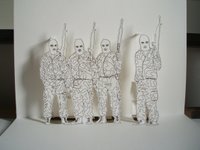
52. Kurzfilmtage Oberhausen
04.05.06
-
09.05.06
Internationale Kurzfilmtage Oberhausen Internationale Kurzfilmtage Oberhausen gGmbHInternational Short Film Festival OberhausenGrillostr. 3446045 OberhausenDeutschlandfon +49 (0)208 825-2652info@kurzfilmtage.dehomepage
52. Internationale Kurzfilmtage Oberhausen Send me to the seas of love, I’m drowning in my blood / Radical Closure Festivalleiter: Lars Henrik Gass Filme von: Harun Farocki, Hussein Chalayan, Anri Sala, Guy Ben-Ner, Avi Mograbi, Yael Bartana, Mona Hatoum, Hussein Chalayan, Clemens von Wedemeyer, Jean-Luc Godard / Anne-Marie Miéville, Jean-Pierre Gorin / Groupe Dziga Vertov, Walid Ra´ad, Hatice Guelreyuez, Mahmoud Hojeij, Omar Amiralay, Hassan Zbib, Olga Nakkas, Cynthia Madansky, Elia Suleiman, Hatice Gueleryuez, Vlatko Gilic, Danielle Arbid, Matei Glass,Rabih Mroueh, Joanna Hajithomas / Khalil Joreij, Ziad Antar, Denis Buga, Hala el Koussy, Christoph Büchel, Miguel Calderon, Marcin Koszalka, Erik van Lieshout, Ahmet Ögüt, Sener Özmen, Oussama Mohamad, Köken Ergun, Sharif Waked, Omar Amiralay, Vlatko Gilic, Lisa Steele, Forough Farrokhzad, Lonnie van Brummelen, Nurit Sharett, Victor Alimpiev, Robert Nelson, Miranda Pennell, Boris Schafgans, Olga Stolpovskaya ...
Podiumsdiskussionen mit: Fareed Armaly, Lonnie van Brummelen, Stuart Comer, Catherine David, Ian White, Stephen Wright, Akram Zaatari ... Radical Closure / Send me to the seas of love, I'm drowning in my bloodThe thematic programme of the 52nd International Short Film Festival Oberhausen presents works from or on the Middle East emerging from and reflecting a background of closing borders and territorial conflicts. Compiled by Lebanese artist Akram Zaatari and headed by a line taken from a Sufi poem by Sayyed Mohammad Hussein Fadlallah, the programme, whose other title, "Radical Closure", is based on a concept by Lebanese writer and video artist Jalal Toufic, features works from countries as diverse as Palestine, Cyprus, Lebanon, Canada, Israel and Yugoslavia. In addition, Fareed Armaly, Catherine David, Lonnie van Brummelen, Stephen Wright, and Akram Zaatari will talk about "Artists as agents of vision" in a panel discussion in the new Oberhausen PODIUM series.
The programme
The programme compiles and presents films and videos that are produced within - or that raise issues related to - situations of closure resulting from wars and / or political territorial conflicts. The programme focuses on a region that was formerly united under the Ottoman Empire, not to promote it as a geopolitical entity, nor to blindly label its production as one of particular ethnic or formal characteristics. Instead, this program aims to look at how film and video functioned throughout a history charged with division, political tension, and political mobilisation, sometimes as a tool, a vehicle to all this, other times as a critical platform.
It also looks at the Middle East as a site of successive wars, excessive division, abundant stereotyping, and subsequently offers an opportunity to study the paradoxical ability of film and video to penetrate these situations in order to describe them. Therefore the programme presents works of different natures and origins - independent films and videos, artists’ films and videos, and documentaries in conjunction with other media documents. The programme considers these works as footnotes, key documents, necessary to the understanding of the state of visual culture under these situations of conflict.
In 11 separate chapters, this programme will look at films and videos that address the questions of borders, closures, wars and the question of militarisation of public life, the rise and oppression of ideologies and religions, and finally misery belts around cities. At the same time, the programme is interested in life in the private space, and particularly in effects of outside violence on the domestic space of home.
Works shown from:
Cyprus, Egypt, Israel, Lebanon, Palestine, Yugoslavia, Syria, Iran, and Turkey, France, Germany, USA and Canada.
Research advisors:
Natasa Petresin
Rasha Salti, CinemaEast Film Festival
The discussion
The panel "Artists as agents of vision / on the subject of wars, political and territorial conflicts" which is part of the new Oberhausen PODIUM series of discussions looks at writers/artists producing and re-producing documents in the contexts of war, political, and territorial conflicts. This is a panel where contributors will present works in photography, film and video to discuss a potential subversive role of documents coming from situations of conflicts, and comment on the forces shaping such forms of representation. Beyond simply challenging the believability or evidence value in documents in general, artists and writers here discuss how one can build or intervene on existing documents, and what one can learn from knowing about their origins and formation, particularly about the links that tie politics to aesthetics, and how does this affect our way of reading and/or constructing images.
Moderator:
Akram Zaatari (artist)
Contributors:
Fareed Armaly (artist) will present a study of Tawfiq Saleh's classic The Dupes (1972) which was based on a story by Palestinian writer Ghassan Kanafani to address notions of representation and identity situated at the intersection between art and the industry of film production.
Catherine David (curator, Documenta X), topic to be announced later.
Lonnie van Brummelen (artist) will talk about her experience in making her silent film triptych Grossraum which explores the composition of the landscape along the current margins of Europe, where photography is not allowed without official permission.
Stephen Wright (art writer) will introduce and discuss the photographic work of Bahman Jalali and Rana Javadi (Iran) which presents a chronicle of the first days of the Islamic Revolution in 1977. Wright looks at the possibility of making images outside the image market and outside surrounding ideologies.
The screenings*
Programme 1: Discourse of resistance and logic of terrorism
Friday, May 5th, 14:30 h
Ici et ailleurs, Jean-Luc Godard/Anne-Marie Miéville, France 1974
Programme 2: The meaning of reproduction
Friday, May 5th, 20:00 h
Hostage: The Bachar Tapes, Walid Raad, Lebanon/USA 2000
Joseph Cicippio, videotape produced in his abduction, 1989
Une sale histoire / Une sale histoire racontée par Jean-Noël Picq, Jean Eustache, France 1977
Programme 3: Education as a Site of Indoctrination
Saturday, May 6th, 14:30 h
The First Ones, Hatice Güleryüz, Turkey 2000
Al yawn wa kol yawn (Today and Everyday), Oussama Mohammad, Syria 1986
Once, Mahmoud Hojeij, Lebanon 1997
Toufan fi balad al baas (A Flood in Baath Country), Omar Amiralay, Syria/France 2003
Programme 4: Make me stop smoking
Saturday, May 6th, 20:00 h
curated by guest artist Rabih Mroué
"I have been collecting worthless material for almost ten years now (...) Today I possess a real archive that relates only to me: a kind of added memory (...) It is an invented memory that is exhausting me and which I cannot liberate myself from. (Uncovering parts of my archive) will be my attempt to destroy a memory that doesn’t know how to erase itself." (Rabih Mroué)
The material:
Testimonies of members of the Lebanese resistance
Two recorded speeches by Ben Laden and Sahhaf
Video rushes of war in Mount Lebanon in 1983
Beirut after the end the war
Images of the artist’s first installation
"I, the under signed". Excerpt from a play that was never shown
Excerpts from a videotape showing the operations of Islamic resistance in South Lebanon
Portraits of missing people. Newspaper cut-outs
The story of a "poster" in Beyrouth. Photographs
Drafts for plays that were never shown
Programme 5: War / the visible signs
Sunday, May 7th, 12:30 h
Mon ami Imad et le taxi (My Friend Imad and the taxi), Olga Nakkas/Hassan Zbib, Lebanon 1985
Still Life, Cynthia Madansky, USA 2004
Auge/Maschine III (Eye/Machine III), Harun Farocki, Germany 2003
Sakreem bil katel, Elia Suleiman, Palestine/USA 1992
Programme 6: Intensive care
Sunday, May 7th, 17:00 h
Intensive Care, Hatice Güleryüz, Turkey 2001
In Continuo, Vlatko Gilic, Yugoslavia 1971
After Words, Hussein Chalayan, Cyprus 2000
Lasting Images, Joanna Hadjithomas/Khalil Joreige,
Lebanon/France 1985-2005
Nous/Nihna, Danielle Arbid, France 2005
Nocturnes, Anri Sala, France 1999
Face A/Face B (Side A/Side B), Rabih Mroué, Lebanon 2002
Magnetic Identities, Matei Glass, Spain 2004
Programme 7: At home?
Monday, May 8th, 12:30 h
WA, Ziad Antar, Lebanon 2004
Tambouro, Ziad Antar, Lebanon 2004
Kardesler (Brothers), Deniz Buga, Turkey 2001
House Hold, Guy Ben-Ner, Israel 2001
Peripheral Stories, Hala el Koussy, Egypt 2005
Programme 8: Schadenfreude
Monday, May 8th, 17:00 h
Guest curator: Tirdad Zolghadr
AC 130 Gunship Video, Christoph Büchel, Switzerland 2004
Inverted Star, Miguel Calderon, Mexico 2002
Such a Nice Boy I Gave Birth To, Marcin Koszalka, Poland 1999
Awakening, Erik Van Lieshout, Netherlands 2005
Cut It Out, Ahmet Ögüt, Turkey 2004
Our Village, Sener Özmen, Turkey 2004
Saida. June 6, 1982, Akram Zaatari, Lebanon 2004
Programme 9; Military culture
Monday, May 8th, 22:30 h
Khotwa khotwa (Step by Step), Oussama Mohammad, Syria 1978
Ben askerim (I, Soldier), Köken Ergun, Turkey 2005
Detail, Avi Mograbi, Israel 2004
Chic Point, Sharif Waked, Israel 2003
Kings of the Hill, Yael Bartana, Netherlands/Israel 2003
Tabaq al sardine, Omar Amiralay, France 1997
Programme 10: Personal narratives
Tuesday, May 9th, 14:30 h
Ljubav (Love), Vlatko Gilic, Yugoslavia 1972
Measures of Distance, Mona Hatoum, Great Britain 1988
(It was) Just a Job, Samir, Switzerland/Iraq 1992
Birthday Suit - with Scars and Defects, Lisa Steele, Canada 1974
Khaneh siah ast (The House Is Dark), Forough Farrokhzad, Iran 1963
Programme 11: Borders
Tuesday, May 9th, 17:00 h
Großraum: Lefkosia, Lonnie van Brummelen, Netherlands 2005
Temporal Meditations, Hussein Chalayan, Cyprus 2004
Sof sof choref (Winter At Last), Nurit Sharett, Israel 2005
Otjesd (Leaving), Clemens von Wedemeyer, Germany 2005
* working version, subject to alterations
52nd International Short Film Festival Oberhausen, 4-9 May 2006
Oberhausen, 24 March 2006
Accreditation deadline for the 52nd International Short Film Festival Oberhausen is 10 April 2006. The accreditation form is available at www.kurzfilmtage.de as download, or it can be requested from the press office.
Press contact: Sabine Niewalda, Fon +49 (0)208-825-3073, niewalda@kurzfilmtage.de












